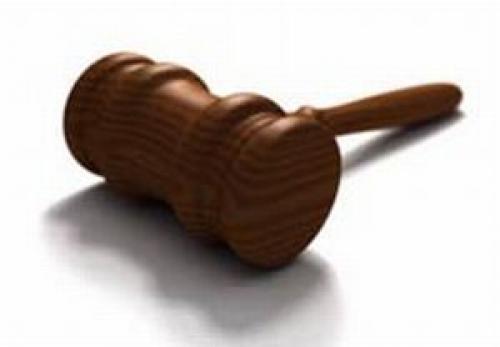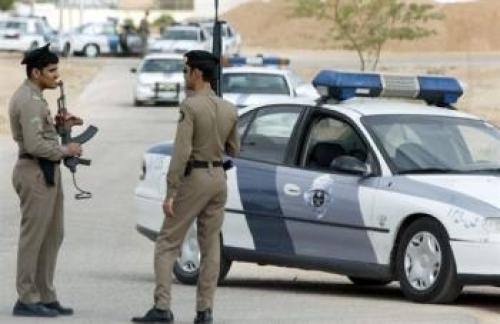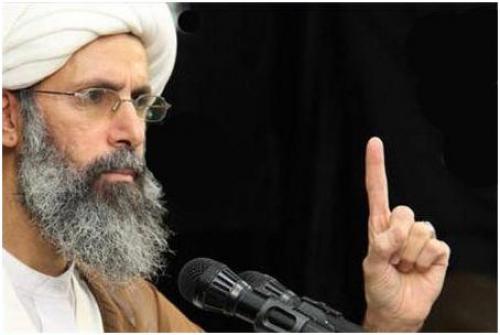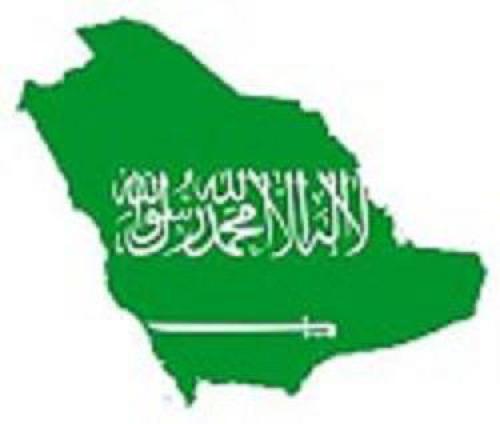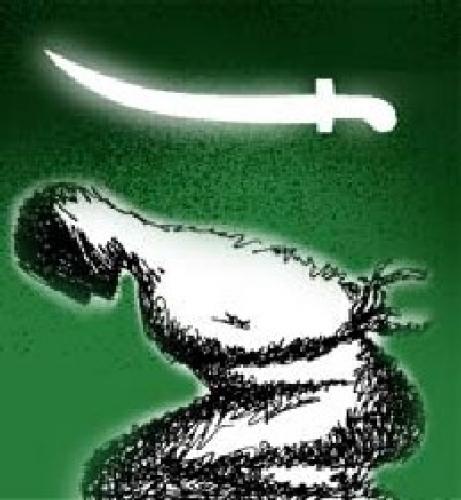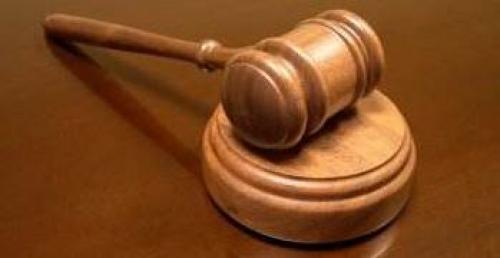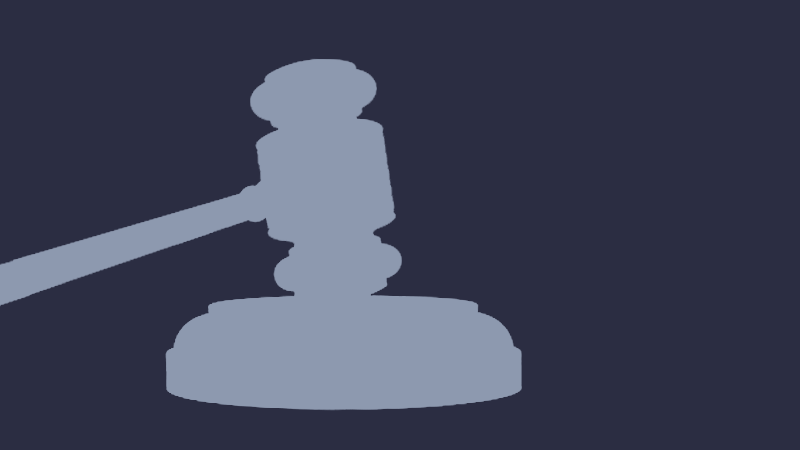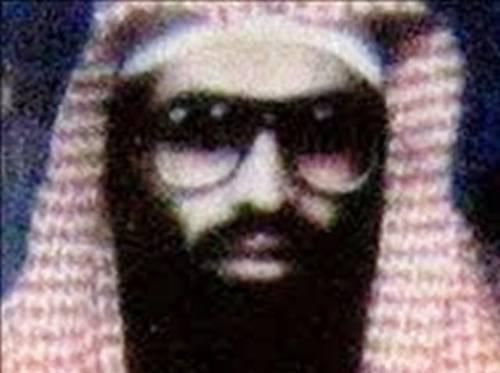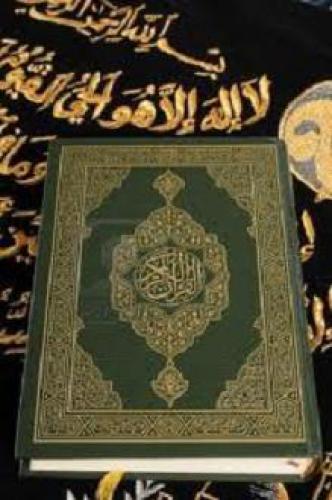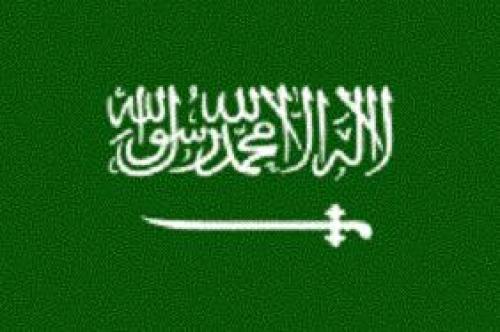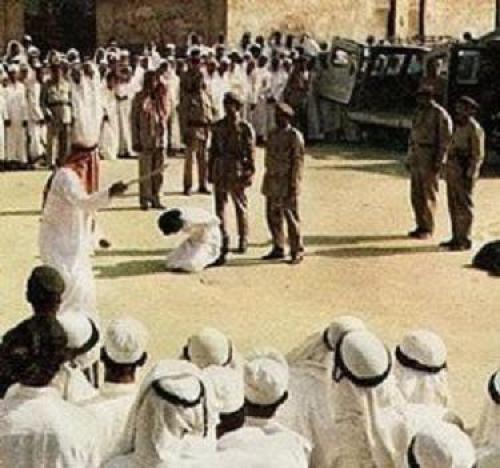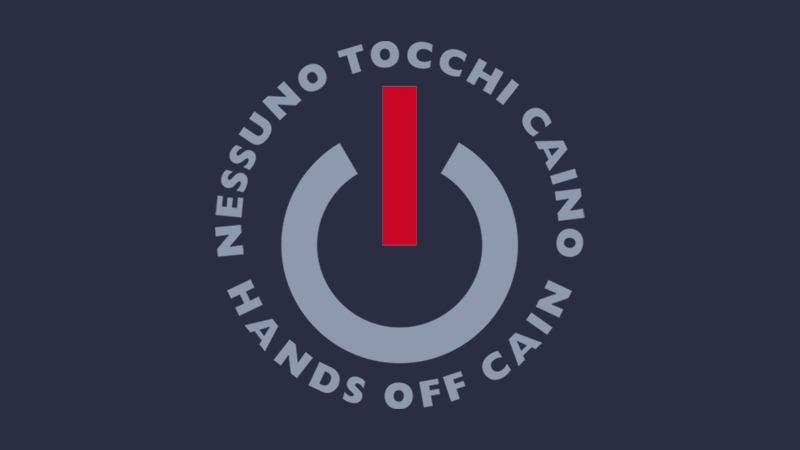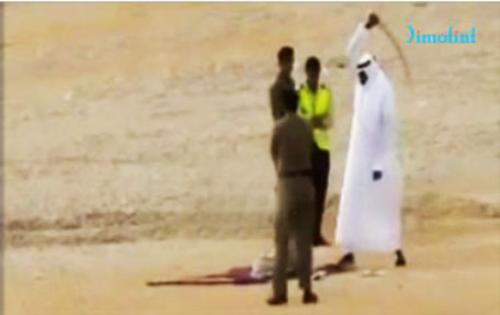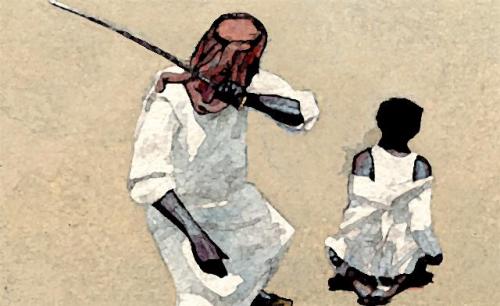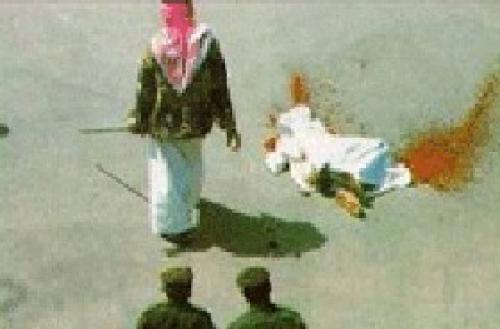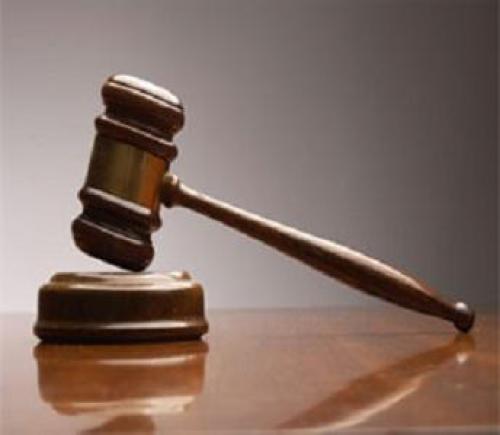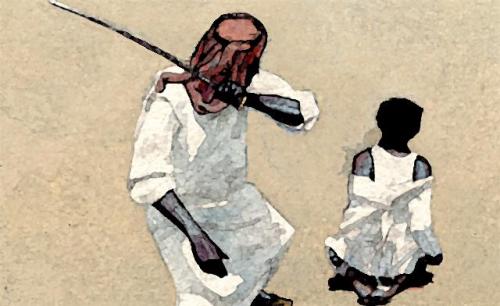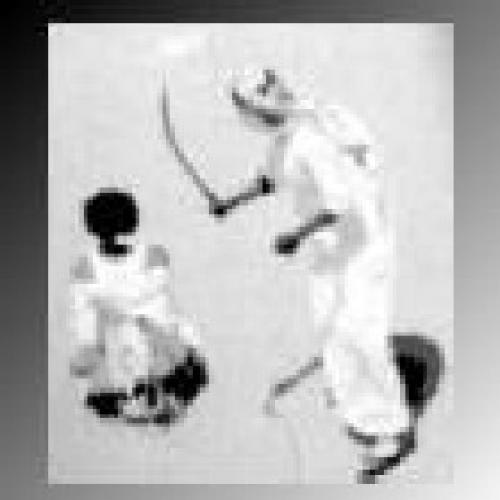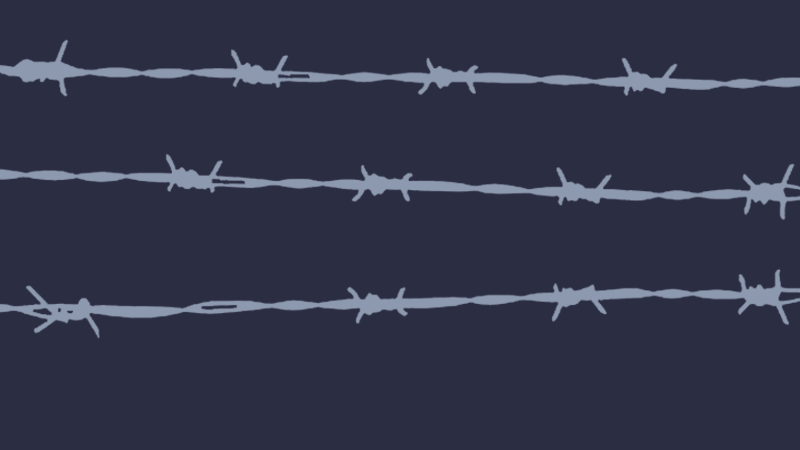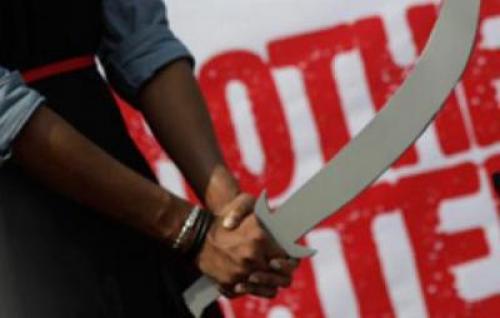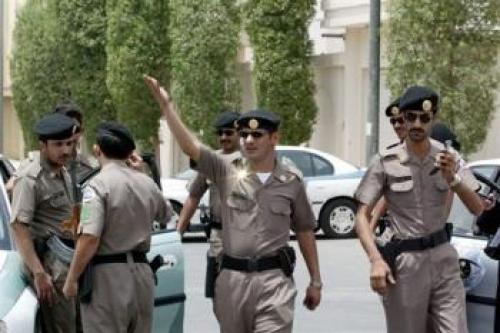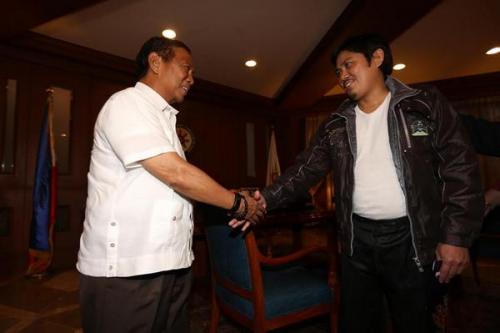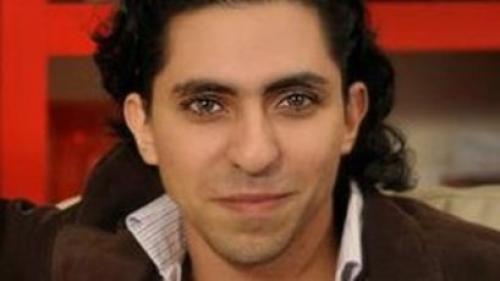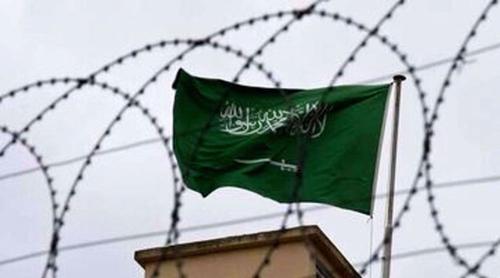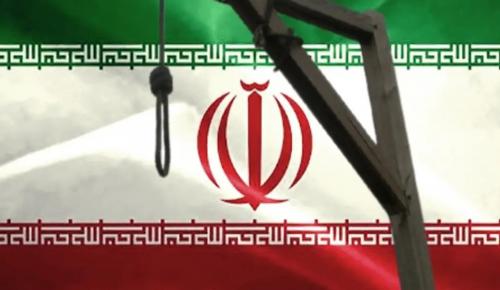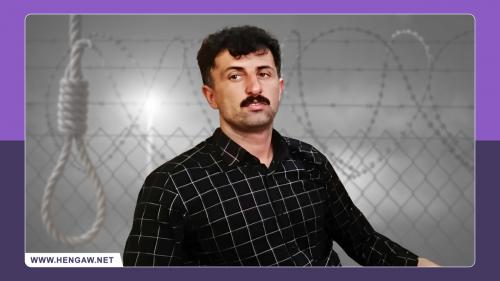government: Traditional monarchy
state of civil and political rights: Not free
constitution: governed according to Shari'a (Islamic law); the Basic Law that articulates the government's rights and responsibilities was introduced in 1992
legal system: based on Sharia law; several secular codes have been introduced
legislative system: a consultative council (90 members and a chairman appointed by the monarch for four-year terms)
judicial system: Supreme Council of Justice
religion: Muslim 100%
death row: more than 100 (Sources: AI, 10/06/2011)
year of last executions: 0-0-0
death sentences: 44
executions: 88
international treaties on human rights and the death penalty:Convention on the Rights of the Child
Convention Against Torture and Other Cruel, Inhuman or Degrading Treatment or Punishment
situation:
Saudi Arabia’s legislation is based on both Sharia principles and
customary law, and the Koran and the Sunna make up the Kingdom’s Constitution.
Saudi Arabia is the Islamic country that most strictly interprets Sharia
law. It prescribes the death penalty for murder, apostasy, rape, drug trafficking,
witchcraft, adultery, consensual sexual relations between adults of same sex,
apostasy, terrorism, treason, espionage and military offences.
Beheading as a means of carrying out executions is exclusive to Saudi
Arabia.
Saudi Arabia has one of the highest execution rates in the world, both in terms of number of people
killed and in relation to its population. Between 1980 and 2002, approximately
1,500 people were put to death in the country. The record number of beheadings
in one year in Saudi Arabia was 191 in 1995.
Many of the announced Saudi executions were for murder and rape, but a wide
range of non-violent crimes also resulted in decapitation. Among the lesser
offences that led to executions were apostasy, witchcraft, sexual practices
considered offences (adultery, sodomy, homosexuality) and crimes involving both
hard and soft drugs.
Dozens of people are arrested each year on charges like witchcraft, recourse to
supernatural beings, black magic and fortune telling. These practices are
considered polytheistic and severely punished according to Sharia law.
The crime of “sorcery” is not defined in Saudi Arabian law but it has been used
to punish people for the legitimate exercise of their human rights, including
their right to freedom of expression. In March 2012, Saudi Arabia decided to
bolster its religious police unit specialized in arresting magicians within an
ongoing war on sorcery which is punishable by execution in the Gulf Kingdom.
The Commission for the Promotion of Virtue and Prevention of Vice, the
influential law enforcement authority in Saudi Arabia, announced that it had
created a “field unit” charged with fighting sorcerers, who it described as
“key causers of religious and social instability in the country.” The new unit,
headed by Sheikh Adel Al Muqbil, a prominent scholar in the Kingdom, “has been
given orders to immediately arrest sorcerers and charlatans and refer them to
the specialized authorities to apply God’s punishment on them and end their
harmful deeds against Muslims,” the Commission said. The Commission has not
specified witchcraft offences in the Kingdom but there have been reports of
cases involving all forms of black magic, including dowsing, exorcism, money
cloning, fortune tellers, healers, bone-setters, makers of potions, herbalists,
palmists, animal callers, alchemists, psychics, and empathy.
In November 2014, the Saudi Arabian government decided to
impose the death sentence on anyone who attempts to import "all
publications that have a prejudice to any other religious beliefs other than
Islam." In other words, anyone who attempts to bring Bibles or Gospel
literature into the country will have all materials confiscated and be
imprisoned and sentenced to death.
It was reported on September 27, 2005, that Saudi Arabia redefined its drug trafficking laws, giving discretionary powers
to judges and allowing them to hand down jail sentences instead of awarding the
death penalty. The Saudi Anti-Drug and Mental Effects Regulation stipulated the
death penalty for drug traffickers, manufacturers and recipients of any
narcotic substances. Judges could now exercise discretion to reduce the
sentence to imprisonment for a maximum of 15 years, sessions of 50 lashes, and
a minimum fine of 100,000 Saudi riyals [more than 26,000 US dollars].
About two thirds of those executed in Saudi Arabia are foreigners. Saudi
justice is especially harsh in its treatment of foreign workers, particularly
those from poorer countries in the Middle East, Africa and Asia, who make up
about a quarter of the Saudi population. Migrant workers are vulnerable to
abuse from their employers as well as from the authorities. If arrested,
foreign nationals may be tricked or coerced into signing a confession in
Arabic, which they may not understand. Migrant workers are frequently tortured
and ill-treated and more likely than Saudis to be executed or punished by
flogging or amputation.
Foreigners condemned to death in Saudi Arabia are typically unaware of their
sentences and have no advance notice of their date of execution. In most cases,
the condemned people do not even know that their trials has been concluded. The
executed do not know what is about to happen to them until the very last
moment. A large number of police come into the cell and ask for the person by
name. Sometimes people are forcibly dragged out.
Human rights organizations maintain that Saudi Arabia often fails to give
defendants fair trials.
Defendants are frequently denied legal assistance before their trials, and
legal representation when they appear in court. In October 2002, Saudi Arabia
allowed access to a UN Special Rapporteur on the independence of the judiciary
for the first time.
On September 12, 2005, Saudi Arabia decided to create a Governing Commission
for Human Rights. According to an official communication, the Commission has
the duty to “protect and strengthen human rights, defend their awareness and
ensure the respect of human rights while following Islamic law.” The decision
to create the commission shortly followed the ascension to the throne of King
Abdullah in August after the death of King Fahd. The creation of a Governmental
body on human rights had been scheduled in previous years.
Saudi Arabia does not have a penal code and judges pass verdicts based on their own
interpretation of Sharia law. In particular, the manner of dealing with
minors, who have been sentenced to flogging or even to death, is cruel and
contradicts the principles of the rule of law and the minimum standards
established by international law. Saudi Arabia ratified the UN Convention on
the Rights of the Child in 1996 and considers it to be a valid source of domestic law.
The treaty prohibits the death penalty and life imprisonment
without parole as punishments for those under the age of 18 at the time of
their crime. However, the Saudi authorities do not seem to take their assumed
responsibilities on human rights through adherence to international treaties
very seriously, because there is a huge divergence between the commitments made
by Saudi Arabia for human rights and its daily reality. Furthermore, the Sharia law of the Kingdom never imposes the
death penalty on persons that have not reached the age of adulthood, and on the
basis of the Regulations of Detention and the Regulations of Juvenile Detention
Centres of A.H. 1395 (1975), that is defined as anyone under the age of 18.
However, a judge could issue a death penalty against the accused if he/she felt
that the offender had reached maturity, regardless of their actual age at the
time of the crime. At least 126 individuals were on death row in Saudi
Arabia for crimes they were found to have committed before age 18, the Saudi
online news station alarabiya.net reported in November 2005, citing government
sources. Human Rights Watch had received reliable reports of children sentenced
to death for crimes committed when they were as young as 13. In 2011, Saudi
Arabia beheaded one person who was officially described as a “juvenile”. In
2009, Saudi Arabia executed two people who were under the age of 18 at the time
of the alleged crimes, while in 2007 there were three of such executions. In 2008 and 2010, no executions of juvenile
offenders were reported.
In Saudi Arabia, acts of terrorism – such as hijacking planes, terrorising
innocent people and shedding blood – amount to “corruption on earth”, a
charge that can carry the death penalty even when the offences do not result in
lethal consequences. The authorities set up specialised courts in 2011 to try
Saudis and foreigners accused of belonging to Al-Qaeda or involvement in
a spate of deadly attacks in the kingdom from 2003-2006. In 2014, at least 59 suspected terrorists were sentenced to death in Saudi Arabia.
On 12 January 2010, Saudi Arabia’s Shura Council passed legislation amending the
Criminal Procedure Law so that death sentences can only be issued if approved
unanimously by all judges in the case. The law stated previously that a
majority vote from the judges is adequate to pass the death sentence. The
amendment also states that lower court verdicts dealing with the severing of
hands or similar punishments must be unanimous, and will not be carried out
without a verdict from the Supreme Court. An overwhelming majority of 92
members voted in favour of the new amendment, while a few members opposed it.
On 14 October 2012, the Shura Council reiterated that a death sentence
issued on the basis of a judge’s discretionary power becomes final only if the
verdict is unanimous. “The court’s endorsement of the death penalty on Tazir
(a judge’s discretion in situations where no religious punishment is
prescribed) should not be made final unless it is by unanimous agreement,” the
council stipulated while discussing recommendations on criminal regulations
made by the Committee for Islamic & Governmental Affairs. The Council voted
down the committee’s recommendation that the implementation of Tazir for
death punishment can be implemented even if the decision is made without
unanimity.
Executions take place in public in the conservative kingdom, and by beheading. They are public domain only
once they are carried out, while family members, lawyers and the condemned
themselves are kept in the dark. The executions are announced by the Minister
of the Interior generally and, usually, filmed by the official Saudi news agency
SPA. State-ordered beheadings are performed in courtyards
outside crowded mosques in major cities after weekly Friday prayer services. A
condemned convict is brought into the courtyard, hands tied, and forced to bow
before an executioner, who swings a huge sword amid cries from onlookers of
"Allahu Akbar!"- Arabic for "God is great." Sometimes, beheading is followed by the public display of the bodies of
the executed. The typical procedure of beheading provides for the executioner
to re-fix the beheaded head onto the body of the executed, so that it may be
hung, generally, for about two hours, from the window or balcony of a mosque or
hung upon a pole, during midday prayers. The pole is sometimes shaped in the
form of a cross, hence the use of the term “crucifixion”. The bodies of the
executed are displayed only on specific orders from the tribunal, when the
crime committed is considered particularly heinous.
In March 2013, Saudi Arabia has authorised regional governors to approve
executions by firing squad as an alternative to public beheading, the customary
method of capital punishment in the kingdom, the Arab News reported on March 11. On March 10, another
newspaper, Al Youm, said the reason for the change was a shortage of
qualified swordsmen. Al Youm reported a circular by the Government’s
bureau of investigation and prosecution as saying the use of firing squads was
being considered because some swordsmen had to travel long distances sometimes
to get to the place of executions, making them sometimes late. The circular
stated that death by firing squad was not a breach of Sharia law. Al
Youm said a firing squad had been used to carry out the death sentence
against a convicted female in a case in Ha’il in north-western Saudi Arabia a
few years ago.
On 13 March 2013, a senior cleric gave his seal of approval for
execution by firing squad, as long as it is as quick or faster than the
traditional method of beheading, it was reported. Sheikh Ali Al-Hakami, member
of the Senior Board of Ulema, was quoted by English language Saudi Gazette
as saying that death by firing squad could be permissible according to Sharia,
as long as the process is painless. “That’s why beheading by sword is the best
way to achieve the purpose of punishment in Islam because it does not cause any
torture,” Al-Hakami said. Al-Hakami added that religious scholars in the Gulf’s
most populous country should also investigate the possibility of using other
methods, such as electric chair, hanging and lethal injections, to find out if
they also comply with Sharia.
The pardon by the victims’ families has to be documented in a court of justice.
Three judges check the information and the form of the granted pardon before
they allow the procedure to go ahead. They also check whether the families’ pardoning
of the prisoners has any special conditions or requirements. In Saudi Arabia,
numerous cases involving “blood money” were resolved positively thanks to the
Saudi Reconciliation Committee (SRC), a nation-wide organization that secures
pardons for death row prisoners and helps settle lengthy inter-family and
tribal disputes through mediation. The SRC, whose executive chairman is Nasser
Bin Mesfir Al-Zahrani, is credited with saving the lives of hundreds of people
sentenced to death since its inception in 2008. Its mission is to prevent
haggling by the families of the murder victims over blood money Diya. In
recent years, there has been growing concern in various parts of the Moslem
world over the growing trend of exorbitant blood money demands, which many
say are fuelled by greed and tribal rivalries. Officials, clerics and writers
have spoken out against the excessive requests, saying an ancient Islamic
practice meant to financially support those who lose loved ones has been
corrupted. In September 2011, Saudi Arabia decided to
triple Diya, the money paid by a killer to the victim’s relatives under
Islamic law, but kept the sum for female victims at half that for male victims.
The Kingdom’s supreme judicial authority raised Diya to 300,000 Riyals
(80,000 USD) from 100,000 Riyals (26,666 USD) in accidental death and 400,000
Riyals (106,666 USD) in premeditated murder. Blood money values have been
static for the last 29 years. The Supreme Council of Scholars had called for
reviewing Diya in light of the increasing prices of camels, which were
used as blood money in the old Islamic age. According to Sharia rules,
the heirs of a murdered person should be compensated with 100 camels.
In 2002, Hands Off Cain counted 49 executions, including at least one woman. 82
executions, including 2 women, were carried out in 2001. At least 52 people
were beheaded in the country in 2003, including one woman. Thirty eight
executions took place in 2004, the lowest number in recent years, however that
figure has already been overtaken with at least 90 executions in 2005. In 2006,
Hands Off Cain counted 39 executions, 166 in 2007, at least 102 in 2008, 69 in
2009, 27 in 2010 and 81 in 2011. In 2012, Saudi Arabia beheaded at least 84
people, 43 Saudis and 41 foreigners, according to a Hands Off Cain tally based
on media reports. A majority of those who were executed were convicted of
murder (43), followed by drug-related offences (37), armed robbery (2), sorcery
(1), and sodomy (1). In 2013, Saudi Arabia beheaded at
least 78 people, 43 Saudis and 35 foreigners. The beheading tally in 2014
reached its highest level in the past five years. Saudi Arabia executed at
least 87 people, according to a Hands off Cain tally based on media reports.
A majority of those who were executed were convicted of murder, followed by
drug-related offences, armed robbery, and incest. In 2015 (as of 26 February),
the kingdom executed at least 34 people, according to an Agence France
Presse tally based on official figures.
On 21 October 2013, Saudi Arabia was reviewed under the Universal Periodic Review of
the UN Human Rights Council. The Government rejected all the recommendations
dealing with the abolition of the death penalty, including recommendation to establish
alternative punishments to the death penalty and suspend its application for
less serious offences and for people who were minors at the time of the crimes,
in the perspective of a moratorium on executions. In response to comments and
questions, Saudi Arabia noted that the death penalty is imposed only for the
most serious crimes and strict procedures are applied to safeguard human rights
when the death penalty is imposed insofar as the judgments are reviewed by 13
judges at the three levels of jurisdiction, in a manner consistent with
international standards.
On 11 June 2014, Saudi Arabia’s Justice Minister defended tough Sharia
punishments such as beheading, cutting off hands and lashing, claiming they
“cannot be changed” because they are enshrined in Islamic law. “These
punishments are based on divine religious texts and we cannot change them,”
Mohammed Al Eissa said during a speech in Washington. The minister said Islamic
law had helped to reduce crime in the conservative kingdom. “Islam sympathises
with the victim, not the criminal,” Al Eissa said. Speaking to American
lawyers, legal consultants and academics, Al Eissa criticised international
human rights groups that call for changes to the kingdom’s judiciary, claiming
they made “big mistakes” because they misunderstood the country and Islam. “Any
attack on the judiciary will be considered an attack on the kingdom’s
sovereignty,” he said.
On 9 September 2014, U.N. independent experts called on Saudi Arabia to implement an immediate moratorium
on the use of the death penalty. "Despite several calls by human rights
bodies, Saudi Arabia continues to execute individuals with appalling regularity
and in flagrant disregard of international law standards," said Christof
Heyns, the U.N. special rapporteur on extrajudicial, summary or arbitrary
executions. "The trials are by all accounts grossly unfair. Defendants are
often not allowed a lawyer and death sentences were imposed following
confessions obtained under torture."
On December 18, 2014, Saudi Arabia voted against the Resolution on a Moratorium
on the Use of the Death Penalty at the UN General Assembly. oratorium on the Use of the Death Penalty at the UN General Assembly.


